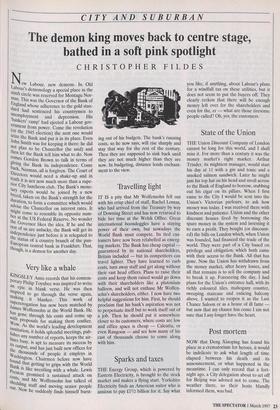State of the Union
THE Union Discount Company of London cannot be long for this world, and I shall miss it. For more than a century it was the money market's right marker. Arthur Trinder, its mightiest manager, would start his day at 11 with a gin and tonic and a smoked salmon sandwich. Later he might jam his top hat on his head and stroll across to the Bank of England to borrow, stubbing out his cigar on its pillars. When I first came to the City I would be sent into the Union's Victorian parlours, to ask how money was today. I was received there with kindness and patience. Union and the other discount houses lived by borrowing the spare money in the system and investing it to earn a profit. They bought (or discount- ed) the bills on London which, when Union was founded, had financed the trade of the world. They were part of a City based on privilege and obligation, which both came with their access to the Bank. All that has gone. Now the Union has withdrawn from the money market, after heavy losses, and all that remains is to sell the company and to break it up. Foreseeing the day, I had plans for the Union's entrance hall, with its richly coloured tiles, mahogany counter, sweeping staircase and enticing balcony above. I wanted to reopen it as the Last Chance Saloon or as a house of ill fame but now that my chance has come I am not sure that I any longer have the heart.


























































 Previous page
Previous page